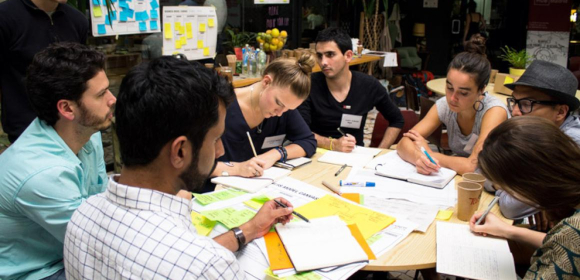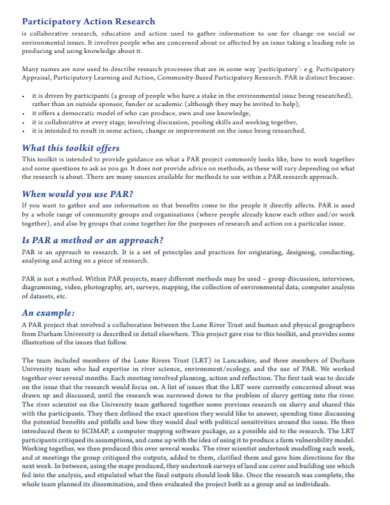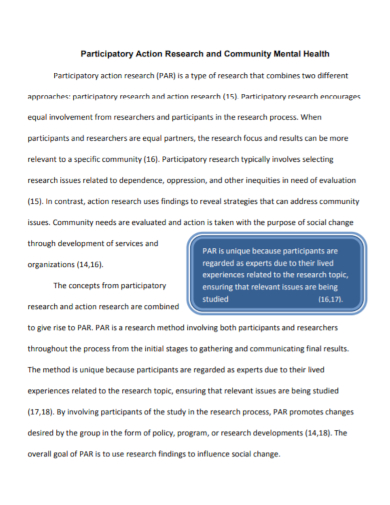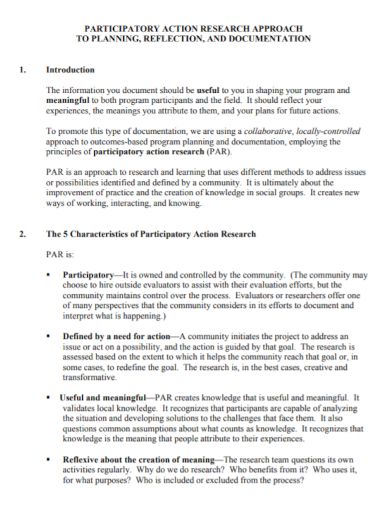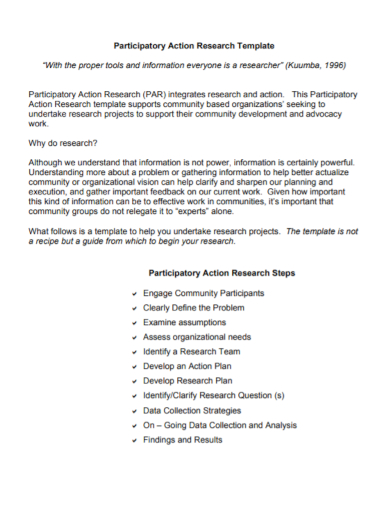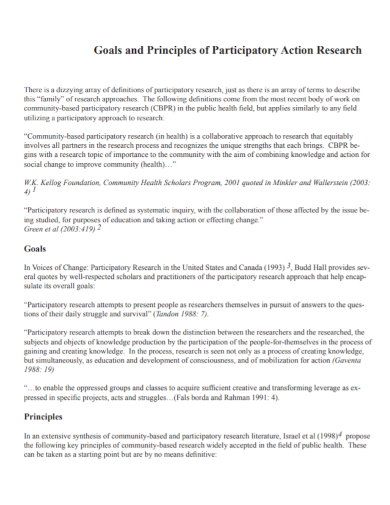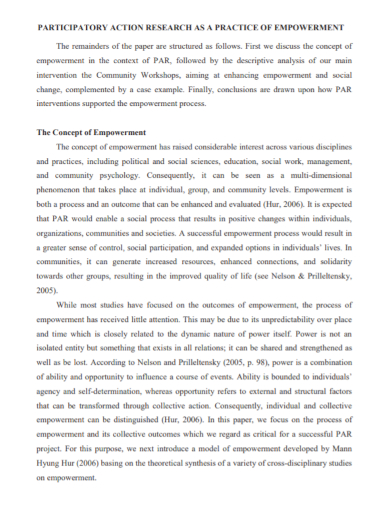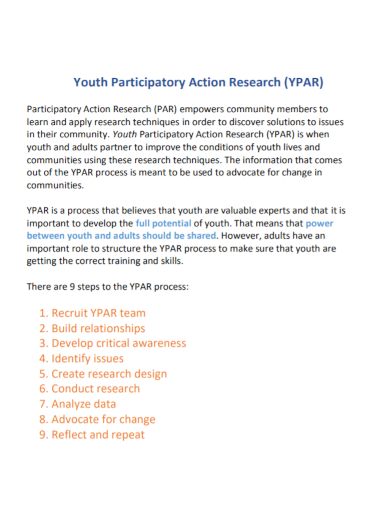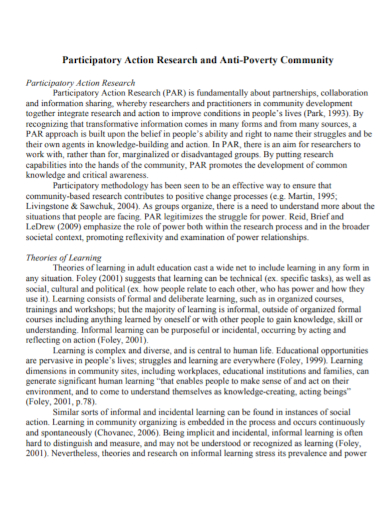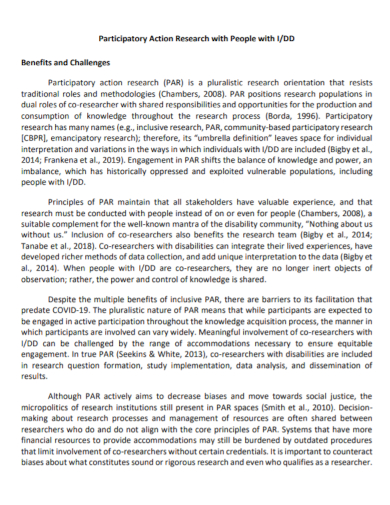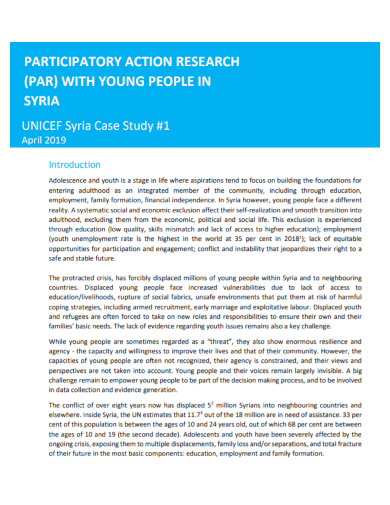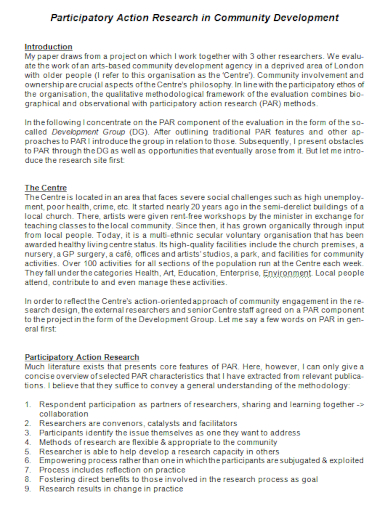The participatory approaches in both research and evaluation provides an avenue to include individuals and groups who are mostly affected by the inquiry and execution process to which ensures that the methods would surely reflect on the perspectives, priorities, cultures, and concerns of those that are being studied. There are group of people like students, teachers, parents, etc. who would be given individual roles in lieu of conducting the participatory action research. Their roles can contribute to a new knowledge about the community or organization. Participatory research is considered to be a widely used strategy when it comes to organizing, engaging, and relating to the equity work.
10+ Participatory Action Research Samples
1. Participatory Action Research
2. Community Health Participatory Action Research
3. Participatory Documentation Action Research
4. Sample Participatory Action Research
5. Participatory Goals Action Research
6. Participatory Empowerment Action Research
7. Youth Participatory Action Research
8. Anti-Poverty Community Participatory Action Research
9. Standard Participatory Action Research
10. Participatory Action Case Study Research
11. Community Development Participatory Action Research
What is a Participatory Action Research?
A Participatory Action Research (PAR) is considered to be the most widely used applied research methodology that offers grant makers a specific opportunity to engage an applied research and put them closest to the issues involved. It also provides a positive change as it helps you in having a objective data and a knowledge where communities can make use of to strengthen themselves.
It also aspires to involve every parties that could be relevant to the evaluation process including the aspects of defining a problem, developing specific questions, gathering data, analyzing and interpreting data, and offering the best recommendation. There will be a building of partnerships happening among evaluators, stakeholders, and those that hold a specific authorized position. Even if it is labeled credible and convincing, Participatory Action Research (PAR) enables you to build and enhance skills and knowledge that can be used by many individuals who are experiencing problems or challenges in the community. From the name itself “participatory”, it means engaging close to the issue while promoting an action.
Reason and Bradbury elaborated the context about the participatory forms of action research and it states: “Action research is a family of practices of living inquiry that aims, in a great variety of ways, to link practice and ideas in the service of human flourishing. It is not so much a methodology as an orientation to inquiry that seeks to create participative communities of inquiry in which qualities of engagement, curiosity, and question posing are brought to bear on significant practical issues. Action research challenges much received wisdom in both academia and among social change and development practitioners, not least because it is a practice of participation, engaging those who might otherwise be subjects of research or recipients of interventions to a greater or less extent as inquiring co-researchers. Action research does not start from a desire of changing others ‘out there,’ although it may eventually have that result, rather it starts from an orientation of change with others.”
FAQs
What are the methods used in conducting a participatory action research?
It includes the following:
- Structured one-on-one interviews, small group or focus group conversations with stakeholders, community forums with larger group of stakeholders, stakeholder surveys, observation of relevant activities, group processes that includes identification and documents, analyses of documents like in reports, news coverage, etc., photo, video, and audio documentaries, and historical inquiries.
What are the PAR strategies and processes?
It includes stakeholders in the entire process, conducted with participants, should be transformative rather than being informative, should be conducted in cycles, empowers participants to build their own knowledge and skills, assumes that neutrality and objectivity does not exist, and challenges power dynamics.
When should a specific foundation consider using PAR for an evaluation?
It is when there are considerations of community transformation and if the program aims to promote civic empowerment, then PAR must be considered for evaluation.
If you want to see more samples and format, check out some participatory action research samples and templates provided in the article for your reference.
Related Posts
FREE 10+ Concurrent Validity Samples & Templates in MS Word | PDF
FREE 10+ Resource Tracking Samples & Templates in MS Word | PDF
FREE 4+ Clinical Case Study Samples & Templates in PDF
FREE 10+ Content Validity Samples & Templates in PDF
FREE 10+ Construct Validity Samples & Templates in MS Word | PDF
FREE 10+ Code of Human Research Ethics Samples & Templates in MS Word | PDF
FREE 10+ Biography Research Report Samples and Templates in PDF
FREE 10+ System Documentation Samples & Templates in MS Word | PDF
FREE 10+ Process Document Samples & Templates in MS Word | PDF
FREE 10+ Action Research Samples & Templates in PDF
FREE 10+ Longitudinal Research Samples & Templates in PDF | MS Word
FREE 10+ Causal Research Samples & Templates in MS Word | PDF
FREE 10+ Client Discovery Samples & Templates in MS Word | PDF
FREE 10+ Null Hypothesis Samples & Templates in MS Word | PDF
FREE 9+ Product Knowledge Samples & Templates in PDF
